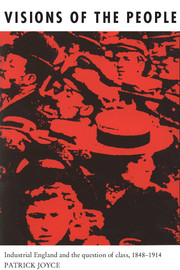Book contents
- Frontmatter
- Contents
- List of plates
- Acknowledgements
- 1 Introduction: beyond class?
- PART I POWER AND THE PEOPLE: POLITICS AND THE SOCIAL ORDER
- PART II MORALISING THE MARKET: WORK AND THE SOCIAL ORDER
- 4 Civilising capital: class and the moral discourses of labour
- 5 Building the union: ‘the gospel of absolute and perfect organisation’
- PART III CUSTOM, HISTORY, LANGUAGE: POPULAR CULTURE AND THE SOCIAL ORDER
- PART IV KINGDOMS OF THE MIND: THE IMAGINARY CONSTITUTION OF THE SOCIAL ORDER
- Appendices
- Bibliographical note
- Notes
- Index
5 - Building the union: ‘the gospel of absolute and perfect organisation’
Published online by Cambridge University Press: 05 March 2012
- Frontmatter
- Contents
- List of plates
- Acknowledgements
- 1 Introduction: beyond class?
- PART I POWER AND THE PEOPLE: POLITICS AND THE SOCIAL ORDER
- PART II MORALISING THE MARKET: WORK AND THE SOCIAL ORDER
- 4 Civilising capital: class and the moral discourses of labour
- 5 Building the union: ‘the gospel of absolute and perfect organisation’
- PART III CUSTOM, HISTORY, LANGUAGE: POPULAR CULTURE AND THE SOCIAL ORDER
- PART IV KINGDOMS OF THE MIND: THE IMAGINARY CONSTITUTION OF THE SOCIAL ORDER
- Appendices
- Bibliographical note
- Notes
- Index
Summary
In the second half of the nineteenth century there is no denying the narrowing in the range of social concerns expressed in the ideas and values accruing around work. Many of the developments behind this have been noted, such as the tendency for politics and economic life to become to some degree separate areas of discourse, a tendency above all evident in the labour legislation of the 1860s and 70s. In securing the relations of labour and capital on a more equal footing, the state in effect withdrew from industrial relations. As has recently been observed, this meant that the market was excluded from politics. Analogous to the effect of free collective bargaining was the ideological power of free trade, which as McKibbin pertinently remarks, before 1914 meant more than socialism did to the working classes. Both developments served to emphasise the same conception of politics and economics: they led towards the justification of market capitalism to workingmen, and to the idea of the autonomy and propriety of a working-class politics, in the limited sense, that is, of the politics of the labour interest as one interest among many.
If we turn to the example of factory industry, it is not difficult to find evidence for this narrowing of concerns, reflecting these changes at a national level, as well as local developments such as the changed attitudes of employers to unions and the success of the Factory Acts.
- Type
- Chapter
- Information
- Visions of the PeopleIndustrial England and the Question of Class, c.1848–1914, pp. 114 - 142Publisher: Cambridge University PressPrint publication year: 1991



